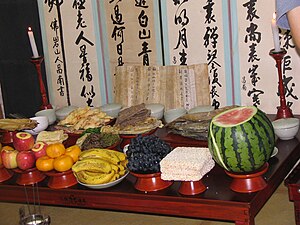Chuseok
| Chuseok | |
|---|---|

Jesasang, ceremonial table setting on Chuseok.
|
|
| Official name | Chuseok (추석, 秋夕) |
| Also called | Hangawi, Jungchu-jeol |
| Observed by | Koreans |
| Type | Cultural, religious (Buddhist, Confucian) |
| Significance | Celebrates the harvest |
| Observances | Visit to their friends' town, ancestor worship, harvest feasts with songpyeon and rice wines |
| Begins | 15th day of the 8th lunar month |
| Ends | 18th day of the 8th lunar month |
| Date | 14–16 September |
| 2017 date | 4–6 October |
| Frequency | Annual |
| Related to |
Mid-Autumn Festival (in China and Vietnam) Tsukimi (in Japan) Uposatha of Ashvini/Krittika (similar festivals that generally occur on the same day in Sri Lanka, Myanmar, Laos, Thailand and Cambodia) |
| Chuseok | |
| Hangul | 추석 |
|---|---|
| Hanja | 秋夕 |
| Revised Romanization | Chuseok |
| McCune–Reischauer | Ch'usŏk |
Chuseok (Korean: 추석), originally known as hangawi (한가위 from archaic Korean for "the great middle (of autumn)"(한가위), is a major harvest festival and a three-day holiday in Korea celebrated on the 15th day of the 8th month of the lunar calendar on the full moon. Like many other harvest festivals around the world, it is held around the autumn equinox.
As a celebration of the good harvest, Koreans visit their ancestral hometowns and share a feast of Korean traditional food such as songpyeon (송편) and rice wines such as sindoju and dongdongju.
According to popular belief, Chuseok originates from gabae (hangul:가배 Gabae started during the reign of the third king of the kingdom of Silla (57 BC ??AD 935), when it was a month-long weaving contest between two teams. Come the day of Gabae, the team that had woven more cloth had won and was treated to a feast by the losing team. However, it is also said that Chuseok marks the day Silla won a great victory over the rival kingdom of Baekje. It is believed that weaving competitions, archery competitions, and martial arts demonstrations were held as part of the festivities.
Many scholars also believe Chuseok may originate from ancient shamanistic celebrations of the harvest moon. New harvests are offered to local deities and ancestors, which means Chuseok may have originated as a worship ritual. In some areas, if there is no harvest, worship rituals are postponed, or in areas with no annual harvest, Chuseok is not celebrated.
In contemporary South Korea, on Chuseok, masses of people travel from large cities to their hometowns to pay respect to the spirits of their ancestors. People perform ancestral worship rituals early in the morning. Then, they visit the tombs of their immediate ancestors to trim plants and clean the area around the tomb, and offer food, drink, and crops to their ancestors. Harvest crops are attributed to the blessing of ancestors. Chuseok is commonly translated as "Korean Thanksgiving" in English.
...
Wikipedia
